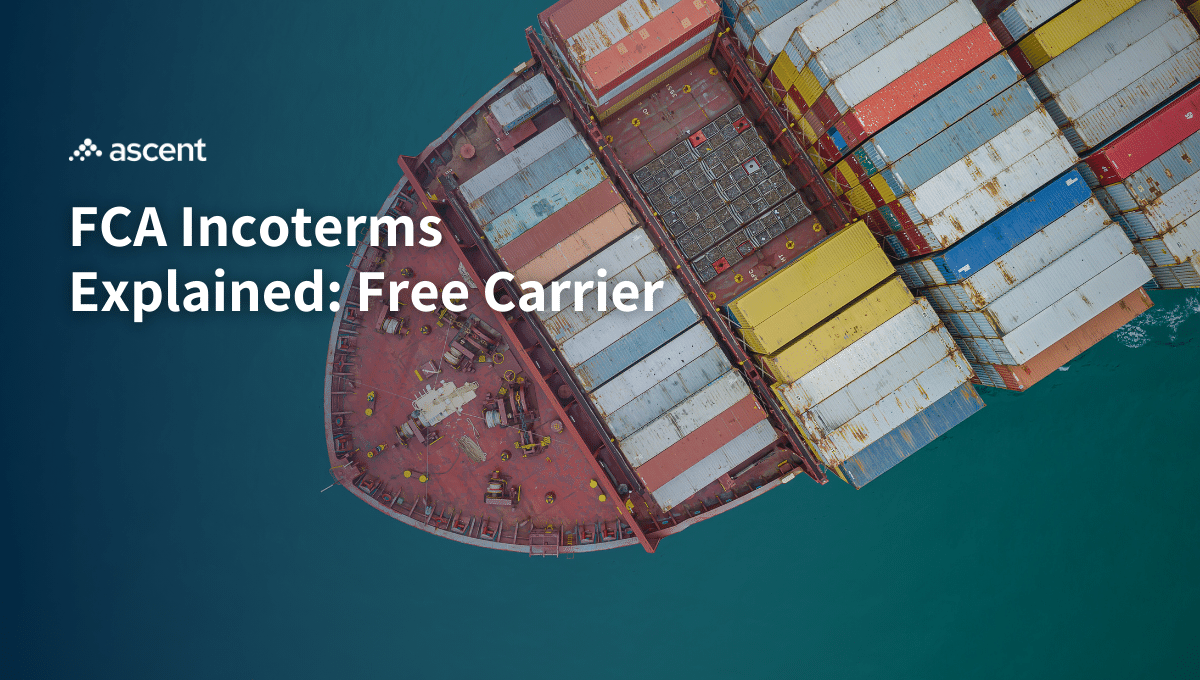FCA Incoterms Explained: Free Carrier
05/23/2024

Incoterms are standardized trade terms used within international trade to clearly define the delivery responsibilities between a buyer and a seller. These terms outline who is responsible for various aspects of the transaction, such as loading and unloading, delivery, payment and insurance. However, when the Free Carrier (FCA) term is selected, who exactly is responsible for what? Let’s get into the details.
What does the FCA term mean in Incoterms?
FCA (Free Carrier) is one of the trade terms defined by the International Chamber of Commerce (ICC) under the Incoterms 2020, which are still the current rules. Under FCA, the seller is responsible for delivering the goods to a carrier at a named place, which can be the seller’s premises or another specified location.
The seller loads the goods onto the transport vehicle and clears them for export. This includes providing all necessary transportation documents, such as bills of lading. The costs and risks transfer from the seller to the buyer at this point. It’s also important to note that the FCA term applies to all modes of transportation.
Responsibilities under the FCA term
With the FCA term, the seller delivers the cargo to a named place, whether it be an airport, marine terminal or another place where the carrier operates. A precisely named place of delivery is essential to avoid any discrepancies. After the seller delivers the freight to the named place, the risk of loss is transferred to the buyer. The buyer assumes all risks and costs associated with delivering the goods to the final destination, including transportation costs and import customs fees.
Seller responsibilities under FCA
The seller is responsible for:
- – Export Packing and Clearance: Export product packing, marking, labeling and export customs clearance.
- – Export Documentation: Providing the buyer with export documentation, such as the commercial invoice and packing list.
- – Information Supply: Supplying the buyer with any manufacturer, product or shipper information needed to complete Importer Security Filings and denied party screenings.
- – Export License: Providing and paying for an export license, if required, for the exportation of the product, when applicable.
- – Delivery to Carrier: Delivering the goods to the named place, which can be their premises or another location. They are responsible for loading the goods if delivery is at their premises.
Buyer responsibilities under FCA
The buyer is responsible for:
- – Contracting Carriage: Arranging the transportation of goods from the named place of delivery. The buyer can request the seller to contract the carriage at the buyer’s risk and expense.
- – Transportation Costs: Paying for the main carriage, including any transportation costs from the named place to the final destination.
- – Import Clearance: Handling import customs clearance and payment of any duties and taxes.
- – Pre-shipment Inspection: Covering the costs of any mandatory pre-shipment inspection, except when such inspection is mandated by the authorities of the export country.
Who bears insurance in FCA?
Under FCA Incoterms, neither the seller nor the buyer is obligated to insure the goods. However, insuring the goods is highly recommended to protect against potential risks during transit. The decision to insure should be explicitly addressed in the sales contract to ensure that both parties understand their responsibilities and the extent of coverage.
Who is liable?
- – Seller’s Liability: The seller’s liability for the goods ends once they deliver the goods to the carrier at the named place. This means that the seller is responsible for any loss or damage to the goods only until this point. Consequently, if the seller is contracting the carriage on behalf of the buyer, it might be prudent for the seller to arrange insurance up to the point of delivery to the carrier.
- – Buyer’s Liability: From the moment the goods are delivered to the carrier, the risk transfers to the buyer. Therefore, the buyer becomes liable for any loss or damage to the goods during transit from the named place to the final destination. It is advisable for the buyer to arrange insurance to cover these risks.
Imagine a buyer in Germany purchasing machinery from a seller in China with the free carrier term “FCA Shanghai Port.” The seller delivers the machinery to the carrier at Shanghai Port, transferring the risk to the buyer. To mitigate risks, the buyer arranges insurance to cover the transit from Shanghai Port to Germany, ensuring protection against potential loss or damage during this leg of the journey.
By addressing insurance explicitly within the contract and ensuring adequate coverage, both parties can safeguard their interests and ensure a smoother transaction under FCA Incoterms.
Get reliable international shipping with Ascent
By clearly defining the responsibilities of both buyers and sellers, FCA helps ensure smooth and efficient transactions. At Ascent, we specialize in providing comprehensive international forwarding solutions that cater to your unique logistics needs. Whether you’re dealing with complex customs regulations or arranging transportation across multiple borders, our team of experts is here to help you navigate every step of the process.
Explore our international freight forwarding solutions today and discover how Ascent can deliver your international cargo with speed and precision.
December 9, 2024
Thank you for contacting Ascent!
A member of our team will be in contact within a few business hours.
Okay